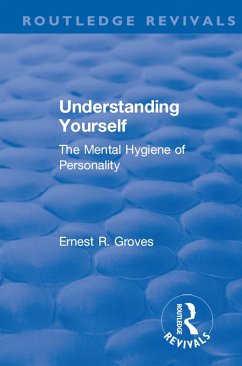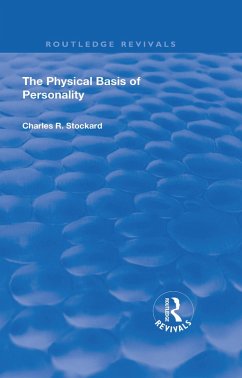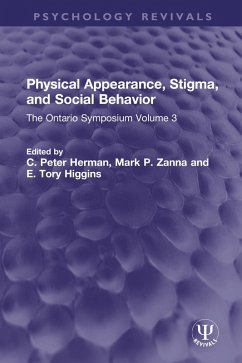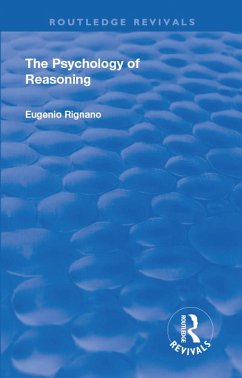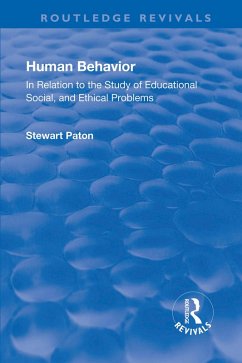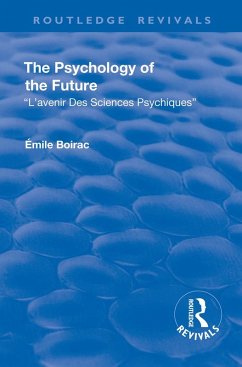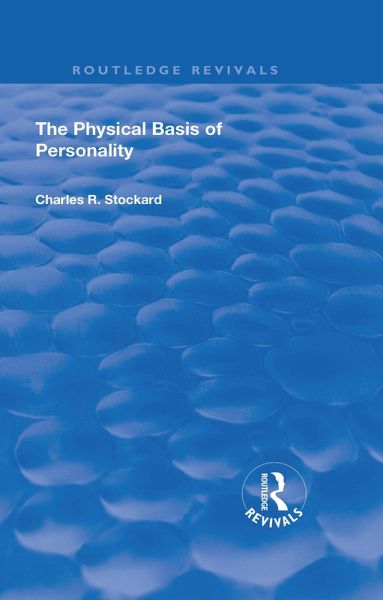
Revival: The Physical Basis of Personality (1931) (eBook, PDF)
Versandkostenfrei!
Sofort per Download lieferbar
56,95 €
inkl. MwSt.
Weitere Ausgaben:

PAYBACK Punkte
28 °P sammeln!
An outcome of the 1930 series of Lane Medical Lectures at Stanford University. To develop the completed personality a long series of interactions between the original basis and the surrounding environment is essential. A discussion of the effects on developing personalities of uniting entire individuals and of transplanting organs and parts leads to a convincing demonstration of the "high improbability of the inheritance of acquired characters."From the chapter on exaggerated deviations from racial types, in which the author treats of dwarfs and giants, we are led into a section on deviations ...
An outcome of the 1930 series of Lane Medical Lectures at Stanford University. To develop the completed personality a long series of interactions between the original basis and the surrounding environment is essential. A discussion of the effects on developing personalities of uniting entire individuals and of transplanting organs and parts leads to a convincing demonstration of the "high improbability of the inheritance of acquired characters."
From the chapter on exaggerated deviations from racial types, in which the author treats of dwarfs and giants, we are led into a section on deviations in structural types among various breeds of dogs. The closing chapters treat mainly of the two normal adult types, the dolichocephalic (linear, long-headed) and the brachycephalic (lateral, short-headed), their characteristics, geographic distribution and age modifications. A brief section is devoted to the sex glands, senility and rejuvenation, the author demonstrating that the sex gland rejuvenation idea is based upon an entirely erroneous conception. Man's deviation from his nearest animal relatives, namely, intellectual achievement, has probably been initiated by two evolutionary changes: (1) some mutation which has resulted in the retention of head proportions comparable to those found in the fetal stages of the higher mammals: this gives a disproportionately large cranium and big brain with small facial region as compared to the reverse adult proportions among other mammals; (2) a germinal mutation resulting in an exaggerated prolongation of childhood and the stages of immaturity to more than twenty years, thus extending enormously the learning period of man. There are considerable experimental material, over seventy figures, and a bibliography of 260 titles.
From the chapter on exaggerated deviations from racial types, in which the author treats of dwarfs and giants, we are led into a section on deviations in structural types among various breeds of dogs. The closing chapters treat mainly of the two normal adult types, the dolichocephalic (linear, long-headed) and the brachycephalic (lateral, short-headed), their characteristics, geographic distribution and age modifications. A brief section is devoted to the sex glands, senility and rejuvenation, the author demonstrating that the sex gland rejuvenation idea is based upon an entirely erroneous conception. Man's deviation from his nearest animal relatives, namely, intellectual achievement, has probably been initiated by two evolutionary changes: (1) some mutation which has resulted in the retention of head proportions comparable to those found in the fetal stages of the higher mammals: this gives a disproportionately large cranium and big brain with small facial region as compared to the reverse adult proportions among other mammals; (2) a germinal mutation resulting in an exaggerated prolongation of childhood and the stages of immaturity to more than twenty years, thus extending enormously the learning period of man. There are considerable experimental material, over seventy figures, and a bibliography of 260 titles.
Dieser Download kann aus rechtlichen Gründen nur mit Rechnungsadresse in A, B, BG, CY, CZ, D, DK, EW, E, FIN, F, GR, HR, H, IRL, I, LT, L, LR, M, NL, PL, P, R, S, SLO, SK ausgeliefert werden.





